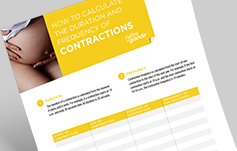Here’s an overview of what to expect when you arrive at your birth location.
Most women give birth in the birthing unit of a hospital or at a birthing centre. To get a better idea of the care and services they offer, consider visiting their website during your pregnancy. Here’s an overview of what to expect when you arrive at your birth location.
First steps at the hospital
Our downloadable guide will help you calculate the duration and frequency of your contractions.

Before you leave for the hospital, it’s recommended to call ahead to let them know you’re on the way. A nurse will take the opportunity to ask you a few questions to evaluate your condition (how far along you are, the frequency of your contractions, whether your water has broken, etc.).
Once you’ve been admitted to the birthing unit, you’ll be greeted by your nurse. Your contractions will likely have started by this stage. If so, your nurse will be able to help you with relaxation exercises.
Your nurse will begin by asking you some questions about your health and your pregnancy. This is a good time to mention your preferences regarding labour and delivery. The nurse will also consult your birth plan if you have one prepared.
At some hospitals, you’re asked to fill out a pre-admission form 20 weeks into your pregnancy.
You will then be asked to sign a consent to care form. By signing this document, you agree to receive general medical care for you and your baby while you are at the hospital. Don’t be afraid to ask questions at any time during your stay in the birthing unit. The staff will provide you with the information you need to make informed choices about tests and procedures.
Most birthing rooms are private, and many include a shower. |
Health assessment
Soon after, the nurse will take a blood sample. Your blood will be tested to screen for infections and anomalies, and the results will determine the course of care you receive in the birthing unit. The test results will also be very useful should you happen to need a blood transfusion during your stay. At this time, depending on the hospital, the nurse may also insert a small tube called a catheter into one of your veins in case it’s needed later on.
In addition to asking questions about your health and pregnancy, your nurse should check your vital signs (heart rate, temperature, blood pressure, etc.).
COVID-19 procedures
Due to the COVID-19 pandemic, many hospitals have changed their procedures for expectant mothers. For example, some facilities require women to take a COVID-19 screening test before being admitted to the birthing unit. They must also wear a mask as long as they’re comfortable doing so and may be placed in specially prepared rooms if they’re likely to have the virus. Lastly, the expectant mother’s support person may join her inside only once she’s officially been admitted. Contact your hospital to find out what procedures are in place in your area. |
Assessment of the progress of labour and the baby’s condition
A nurse will listen to your baby’s heartbeat and determine its position by gently palpating your belly. This is a painless examination that’s performed while you are sitting in bed.
During a contraction, the nurse will palpate your belly to assess the intensity of the contractions. They will then ask you to indicate where the contractions are most intense (e.g., in the pelvic region or lower back).
Finally, a nurse will assess your labour progress by performing a cervical exam. They will check the dilation and effacement of the cervix, how far the baby has descended into the pelvis, and the status of the membranes. It may be necessary to perform this exam several times during labour.
You have the right to be informed of the risks and side effects of any proposed treatments. You’re free to refuse these interventions if you don’t consider them necessary. To find out more, consult our fact sheet on women’s rights during pregnancy and childbirth. |
IV fluids and electronic fetal monitoring
Depending on the progress of labour, certain procedures may be necessary to ensure your baby’s safety as well as your own. For example, you may need an IV to receive intravenous medications or if you want an epidural.
Some hospitals may also use electronic monitors to keep an eye on your baby’s condition. These monitors will track your baby’s heart rate and your contractions throughout labour.
Arrival at the birthing centreIf a midwife is following your pregnancy, make sure to call them before going to the birthing centre. They’ll ask you a few questions about your contractions and your labour progress to help you determine whether it’s time to head to the birthing centre.
The midwife will get there before you to prepare the room you’ve chosen for your delivery. When you arrive, they’ll give you a moment to settle in and get comfortable with the space. They will then listen to your baby’s heartbeat using a handheld Doppler device and check your vital signs.
As a general rule, no other routine procedures are performed when you arrive at a birthing centre. For example, the midwife will perform a vaginal exam only if needed or if you request it. They will determine what measures to take based on your situation and preferences. |
Things to keep in mind
-
It’s recommended to call your hospital’s birthing unit or your midwife before going to your birth location.
-
A nurse will ask you a few questions to find out more about your health and pregnancy.
-
The nurse will carry out several tests to determine the care you’ll need during labour and delivery.
| Scientific review: Amélie Guay, M. Sc., ICP(C), perinatal advanced practice clinical nurse, CHUM
Research and copywriting:The Naître et grandir team
Updated: September 2020
|
Photo: iStock/nattanan726